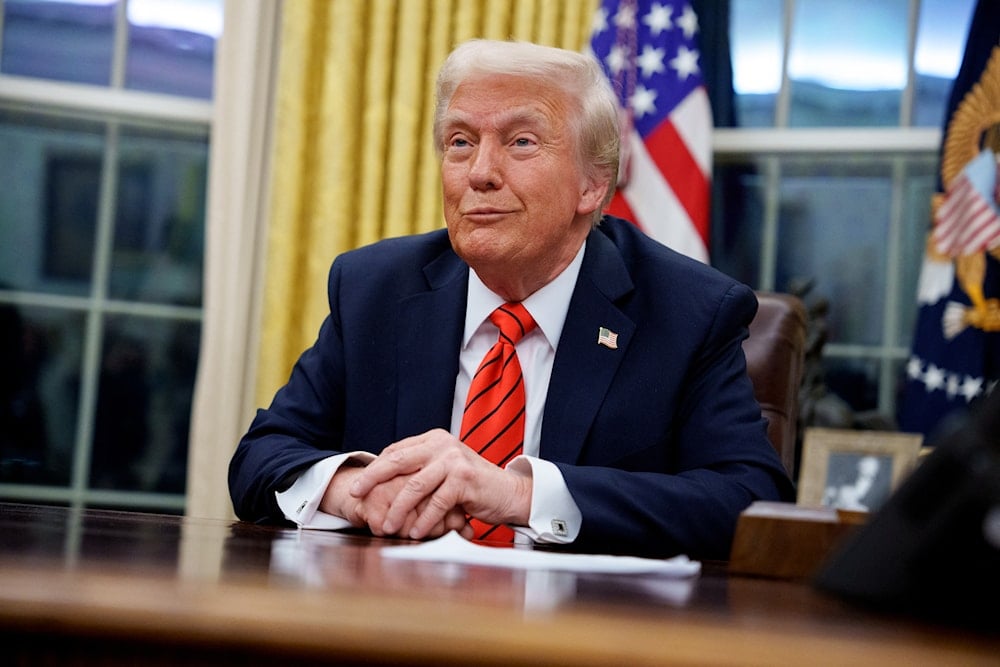Trump: Ukraine 'may be Russian someday'
US President Donald Trump confirms he will soon dispatch his special envoy, Keith Kellogg, to Ukraine to develop a proposal aimed at ending the war.
-

US President Donald Trump reacts to a question from a reporter after signing a series of executive orders including 25% tariffs on steel and aluminum in the Oval Office at the White House, on February 10, 2025, in Washington, DC. (Getty Images via AFP)
Ukraine "may be Russian someday," US President Donald Trump suggested, as Vice President JD Vance prepares to meet with Ukrainian President Volodymyr Zelensky later this week.
During an interview for Fox News that aired Monday, Trump, who has been advocating for an end to the nearly three-year war with Russia, commented on the conflict, saying, "They may make a deal, they may not make a deal. They may be Russian someday, or they may not be Russian someday."
Trump also emphasized the need for the US to see a return on its financial aid to Ukraine, proposing a trade for Kiev's natural resources, including rare minerals.
"We are going to have all this money in there, and I say I want it back. And I told them that I want the equivalent, like $500 billion worth of rare earth," Trump said. "And they have essentially agreed to do that, so at least we don't feel stupid."
Additionally, Trump confirmed Monday that he will soon dispatch his special envoy, Keith Kellogg, to Ukraine to develop a proposal aimed at ending the conflict.
Significant part of Ukraine wants to become Russia: Peskov
Kremlin spokesperson Dmitry Peskov indicated on Tuesday that a significant part of Ukraine wants to become Russia, and this is a fact that history has already confirmed.
"It is a fact that a significant part of Ukraine wants to become Russia, and that it has already become Russia. This is a fact that happened on earth, four new Russian regions. People who, despite the many dangers, stood in queues and voted in the referendum for joining the Russian Federation — this largely corresponds to the words of President Trump," Peskov said.
"You know, any phenomenon occurs with a probability of 50% — either yes or no. I cannot say anything else," he added.
Additionally, the Russian diplomat said the fact that Trump quoted Russian President Vladimir Putin's words can hardly be regarded as a signal of a rapprochement between the positions of Russia and the US.
Late on Monday, Trump posted on Truth Social a link to a CNBC broadcaster article with Putin's statement that the US President would quickly restore order in relations with the European elites, who would "stand at the feet of the master and will wag their tails a little."
"I do not think [that this means a signal of the Russia-US rapprochement]," Peskov told reporters.
While Trump is pushing for a swift resolution, Zelensky is seeking firm security guarantees from Washington as part of any agreement with Moscow.
Kiev fears that a settlement lacking solid military commitments—such as NATO membership or the deployment of peacekeeping forces—would merely give Moscow time to regroup and rearm for another offensive.
Zelensky’s spokesperson, Sergiy Nikiforov, told AFP that the Ukrainian President will meet with Vance this Friday on the sidelines of the Munich Security Conference.
A source in Zelensky’s office stated that Kellogg is expected to arrive in Ukraine on February 20, though details on his itinerary remain undisclosed. His visit will take place just days before the third anniversary of the start of the war in Ukraine on February 24.
On Monday, Zelensky reiterated the need for "real peace and effective security guarantees" for Ukraine, emphasizing the security of the Ukrainian people, the state, and economic relations, as well as the country's long-term resource sustainability.
"All of this is being decided now," Zelensky said in a video address on social media.
Trump has expressed his intention to mediate an end to the war but has yet to present a concrete plan for negotiations.
Both Zelensky and Russian President Vladimir Putin have ruled out direct talks, and there remains little common ground for a potential agreement.
Putin insists that Ukraine withdraw from areas in the south and east that it still controls and has categorically rejected any Ukrainian integration with NATO.
Zelensky, on the other hand, refuses to concede any territory to Russia, though he acknowledges that diplomatic channels may be necessary to regain some areas.
Moscow recognized five previously Ukrainian regions—Crimea in 2014, followed by Donetsk, Kherson, Lugansk, and Zaporizhzhia in 2022—though it does not have full control over them.
On Monday, Zelensky confirmed that arrangements are being made for a meeting with Trump, though a date has yet to be set. Trump, meanwhile, stated last week that he would "probably" meet with Zelensky soon but ruled out personally visiting Kiev.
According to The New York Post, Trump told the outlet on Saturday that he had spoken with Putin about ending the war, quoting the Russian leader as saying he "wants to see people stop dying."
However, Kremlin spokesperson Dmitry Peskov declined to confirm or deny that such a conversation took place.
Organizers of the Munich Security Conference announced Monday that Zelensky will attend the February 14-16 summit.
The US delegation is expected to include Secretary of State Marco Rubio, along with Kellogg and Vance, according to conference chair Christoph Heusgen. No Russian government representatives will be present, Heusgen added.
Read more: US plan on Ukraine to include conflict freezing, guarantees: Bloomberg

 5 Min Read
5 Min Read









